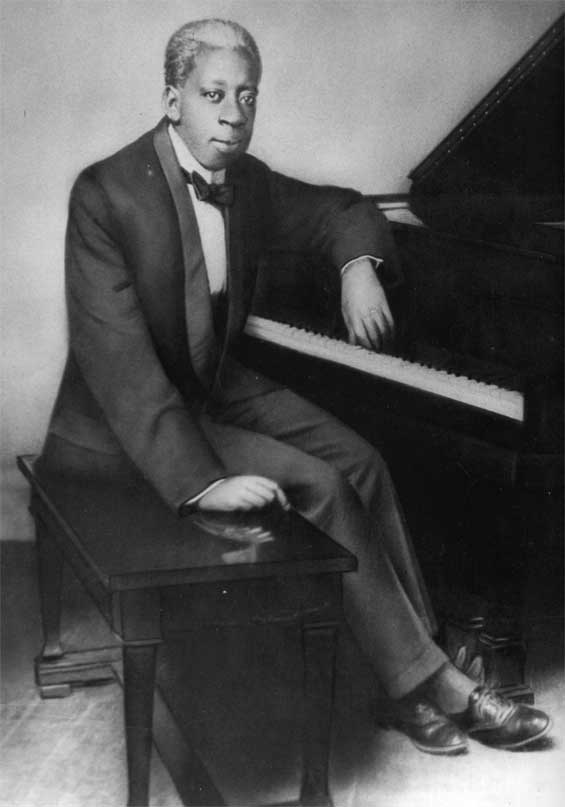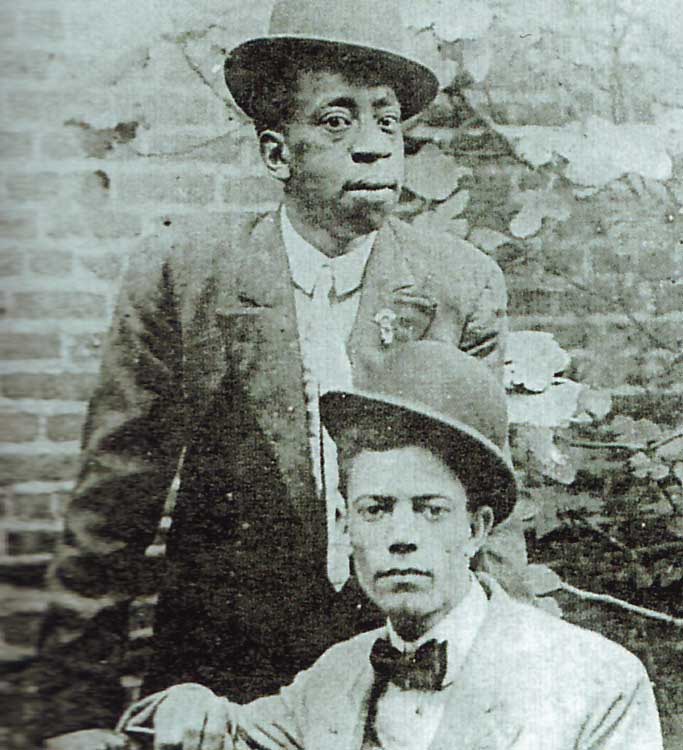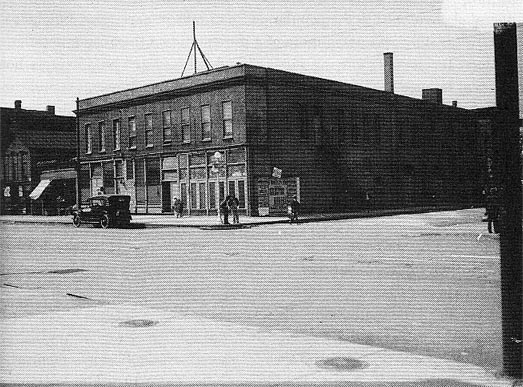Tony Jackson
Text by Tristan Cabello. Copyright (©) by Tristan Cabello, 2008. All rights reserved.
The Great Migration
During the Great Migration, a movement of approximately seven million African-Americans out of the Southern United States to the North, Midwest and West from 1916 to 1930, Bronzeville’s homosexual population grew rapidly. African Americans migrated to escape racism, seek employment opportunities in industrial cities, and get better education. [1]
Like the millions of African-Americans who left behind the poverty and racism in the South for a more respectable, dignified and stable life in the North, Black homosexuals traveled to urban centers to find better-paying jobs, but also to take advantage of the opportunities for homosexual encounters, which they knew were often abundant in large cites. In an environment of relative sexual freedom, African-Americans in Bronzeville could establish relationships with members of the same sex, and these relationships were often accepted by the neighborhood authorities and by its residents.
City Anonymity
The anonymous nature of a large city allowed for discretion in regards to one’s sexual life. The American urban reformers at the turn of the century were very much aware of how such anonymity allowed for the growth of “illicit sexual outlets.” New York’s Committee of Fifteen, a committee of urban moralists, issued a vice report in 1902 which delineated this “problem of anonymity”:
The main external check upon a man’s conduct, the opinion of his neighbors, which has such a powerful influence in the country or small town, tends to disappear, in a great city where one has no neighbors, No man knows the doings of even his close friends, few men care what the secret life of their friends may be. Then with his moral sensibilities blunted, the young man is left to follow his own inclinations.[2]
A similar statement of concern was made by the “Chicago Vice Commission” during the same period:
Although sexual behavior could be controlled in a small community, the situation is more difficult in a city the size of Chicago. Here an individual may, if he chooses, live any life he pleases, so far as his personal habits are concerned, and no one be the wiser [3]
The anonymity of Bronzeville provided the necessary pre-condition for queer networks to take root and grow.
Tony Jackson, A Gay Blues Pianist from Chicago
Blues pianist Tony Jackson) was one of the many homosexual migrants who decided to leave their native South to take advantage of Chicago’s freedom. Born in New Orleans in 1884 [4], Jackson spent his youth in saloons, gambling halls, and brothels in the Black neighborhood of Storyville.
Despite his great popularity as a musician, Jackson often complained about the tough homosexual life in New Orleans. In search of a place of residence more receptive to his music and sexual orientation, the musician migrated to Chicago in 1912. [5] But efore reaching Chicago, Jackson stopped in Louisville, KY where he met one of the leading pianists of the town, Glover Compton with whom he had a long-term friendship. [6]
Blues singer Jelly Roll Morton, a friend of the pianist, claimed that Jackson had migrated to Chicago because “he happened to be one of those gentlemen that a lot of people call […] lady or sissy.” According to Morton, Jackson “liked his freedom in Chicago,” a freedom that included the ability to work full time in Bronzeville’s most renowned cabarets, theaters, and cafés, as well as the possibility of encounters with men of similar sexual orientations. Jackson was one of the best and most popular musicians in the Southside, often performing at Elite No. 1, Elite No. 2, and the Pekin Café. [7]
In moving to Chicago, Tony Jackson transformed the work of other blues musicians who surrounded him, and as many homosexuals before and after him, the culture and social life of the neighborhood. [8]
Nonetheless, Jackson never discussed his own homosexuality publicly. He did not make any records, but published nine songs in the period from 1916 to 1920, including the very popular Pretty Baby [Watch Dean Martin performing Pretty Baby]. Some historians believe that the original lyrics of the song were written for his male partner, though the lyrics of the song released for sale, reworked by Gus Kahn and Egbert Van Alsine, clearly refer to a woman...
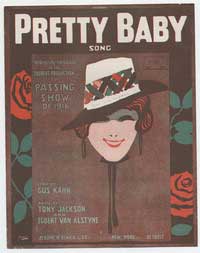
A heavy drinker, Jackson suffered from cirrhosis of the liver before he died in his apartment on 20th April 1921 at age 38.
Historians Al Rose and Edmond Souchon obtained a copy of Jackson’s death certificate in July 1959, reproduced New Orleans Jazz: A Family Album. [9]
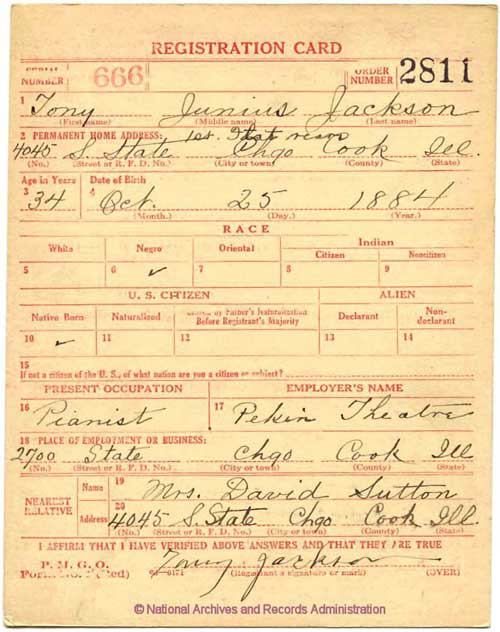
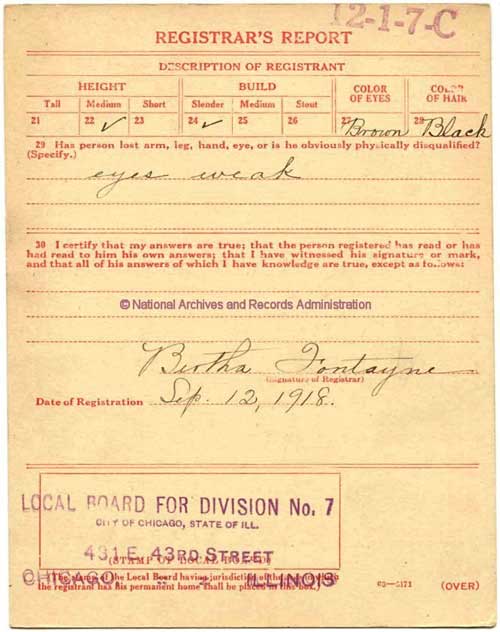
See also:
U.S. Library of Congress: Historical Recordings from the Library of Congress
References
- ↑ On the Great Migration: St Clair Drake and Horace R Cayton, Black Metropolis: A Study of Negro Life in a Northern City (1945; Chicago: University of Chicago Press, 1993); James Grossman, Land of Hope: Chicago, Black Southerners, and the Great Migration (Chicago: University of Chicago Press, 1989); Kenneth Kusmer, A Ghetto Takes Shape: Black Cleveland, 1870-1930 (Urbana: University of Illinois Press, 1987); Joe W. Trotter, Jr, Black Milwaukee: The Making of an Industrial Proletariat (Urbana, IL: University of Illinois Press, 1985).
- ↑ Edwin R. A. Selegman, ed., The Social Evil with Special Reference to Conditions existing in the City of New York: a Report prepared under the Direction of the Committee of Fifteen (New York, 1912), 8
- ↑ Vice Commission of Chicago, The Social Evil in Chicago: A Study of Existing Conditions (Chicago, 1911), 218
- ↑ Many historians believe Jackson was born in1976 due to the publication of They All Played Ragtime by musicologists Rudy Blesh and Harriett Janis. Blesh and Janis had interviewed Tony’s sisters, Ida Jackson and Maria Sutton in Chicago but it seems that Ida Jackson had misunderstood the question as she was herself born in New Orleans in June 1876. (see: http://www.doctorjazz.co.uk/draftcards3.html)
- ↑ Alan Lomax, Mister Jelly Roll (1950; London Virgin Books, 1991), 45. Jonathan Ned Katz adds to this note based on Lomax, page 45: According to Jelly Roll Morton, "Tony [Jackson] happened to be one of those gentlemens that a lot of people call them lady or sissy, ... and that was the cause of him going to Chicago about 1906. He liked the freedom there". Katz notes that Lomax quotes from Jelly Roll Morton, Library of Congress Recordings, vol. 7, side I, band I [interview with Morton recorded May-June 1938]).
- ↑ Rudi Blesh and Harriet Janis, They All Played Ragtime (Alfred A. Knopf, New York, 1950)
- ↑ ; Al Rose, New Orleans : Being an Authentic, Illustrated Account of the Notorious Red Light District (Birmingham, AL : The University of Birmingham Press, 1978).
- ↑ See articles published by the Chicago Defender: Columbus Bragg. "MUSICAL AND DRAMATIC :"All Passes, Art Alone Endures" ON AND OFF THE STROLL," The Chicago Defender (Big Weekend Edition) (1905-1966), August 1, 1914; Columbus Bragg, "ON AND OFF THE STROLL," The Chicago Defender (Big Weekend Edition) (1905-1966), August 15, 1914; Columbus Bragg, "ON AND OFF THE STROLL," The Chicago Defender (Big Weekend Edition) (1905-1966), October 17, 1914; Columbus Bragg. "ON AND OFF THE STROLL." The Chicago Defender (Big Weekend Edition) (1905-1966), July 25, 1914; Columbus Bragg, "SACRED CANTATA AT BETHEL CHURCH," The Chicago Defender (Big Weekend Edition) (1905-1966), November 7, 1914; EDDIE GRAY, "AN EPISTLE," The Chicago Defender (Big Weekend Edition) (1905- 1966), February 3, 1917; "ANSWERS," The Chicago Defender (Big Weekend Edition) (1905-1966), December 13, 1919; "BIG BENEFIT." The Chicago Defender (Big Weekend Edition) (1905-1966), February 26, 1921; "CITY NEWS IN BRIEF :ST. MARK SUNDAY LYCEUM," The Chicago Defender (National edition) (1921-1967), April 30, 1921; "Clarence Muse Goes Big at Avenue; Bob Russell Company at the Grand :THE AVENUE," The Chicago Defender (Big Weekend Edition) (1905-1966), November 9, 1918; "Display Ad 25 -- No Title." The Chicago Defender (Big Weekend Edition) (1905-1966), October 5, 1918; "MUSICAL AND DRAMATIC :"All Passes, Art Alone Endures" ON AND OFF THE STROLL BY COLUMBUS BRAGG THE GRAND THEATER." The Chicago Defender (Big Weekend Edition) (1905-1966), September 5, 1914; "Obituary 3 -- No Title," The Chicago Defender (National edition) (1921- 1967), April 30, 1921; "Opens With Creole Jass Band at 11 O'Clock Each Night." The Chicago Defender (Big Weekend Edition) (1905-1966), May 25, 1918; "Pekin Beaux Arts Club Has Three Sons Birds," The Chicago Defender (Big Weekend Edition) (1905-1966), April 27, 1918; "Review 1 -- No Title," The Chicago Defender (Big Weekend Edition) (1905-1966), September 12, 1914.
- ↑ Al Rose and Edmond Souchon, New Orleans Jazz: A Family Album (Louisiana State University Press, 1967), 300.
Categories
<comments />
